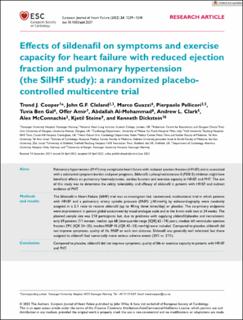Effects of sildenafil on symptoms and exercise capacity for heart failure with reduced ejection fraction and pulmonary hypertension (the SilHF study): a randomized placebo-controlled multicentre trial
| dc.contributor.author | Cooper, Trond Johan | |
| dc.contributor.author | Cleland, John G.F. | |
| dc.contributor.author | Guazzi, Marco | |
| dc.contributor.author | Pellicori, Pierpaolo | |
| dc.contributor.author | Ben Gal, Tuvia | |
| dc.contributor.author | Amir, Offer | |
| dc.contributor.author | Al-Mohammad, Abdallah | |
| dc.contributor.author | Clark, Andrew L. | |
| dc.contributor.author | McConnachie, Alex | |
| dc.contributor.author | Steine, Kjetil | |
| dc.contributor.author | Dickstein, Kenneth | |
| dc.date.accessioned | 2022-09-13T13:31:23Z | |
| dc.date.available | 2022-09-13T13:31:23Z | |
| dc.date.created | 2022-09-07T17:34:51Z | |
| dc.date.issued | 2022 | |
| dc.identifier.issn | 1388-9842 | |
| dc.identifier.uri | https://hdl.handle.net/11250/3017572 | |
| dc.description.abstract | Aims: Pulmonary hypertension (PHT) may complicate heart failure with reduced ejection fraction (HFrEF) and is associated with a substantial symptom burden and poor prognosis. Sildenafil, a phosphodiesterase-5 (PDE-5) inhibitor, might have beneficial effects on pulmonary haemodynamics, cardiac function and exercise capacity in HFrEF and PHT. The aim of this study was to determine the safety, tolerability, and efficacy of sildenafil in patients with HFrEF and indirect evidence of PHT. Methods and results: The Sildenafil in Heart Failure (SilHF) trial was an investigator-led, randomized, multinational trial in which patients with HFrEF and a pulmonary artery systolic pressure (PASP) ≥40 mmHg by echocardiography were randomly assigned in a 2:1 ratio to receive sildenafil (up to 40 mg three times/day) or placebo. The co-primary endpoints were improvement in patient global assessment by visual analogue scale and in the 6-min walk test at 24 weeks. The planned sample size was 210 participants but, due to problems with supplying sildenafil/placebo and recruitment, only 69 patients (11 women, median age 68 (interquartile range [IQR] 62–74) years, median left ventricular ejection fraction 29% (IQR 24–35), median PASP 45 (IQR 42–55) mmHg) were included. Compared to placebo, sildenafil did not improve symptoms, quality of life, PASP or walk test distance. Sildenafil was generally well tolerated, but those assigned to sildenafil had numerically more serious adverse events (33% vs. 21%). Conclusion: Compared to placebo, sildenafil did not improve symptoms, quality of life or exercise capacity in patients with HFrEF and PHT. | en_US |
| dc.language.iso | eng | en_US |
| dc.publisher | Wiley | en_US |
| dc.rights | Attribution-NonCommercial-NoDerivatives 4.0 Internasjonal | * |
| dc.rights.uri | http://creativecommons.org/licenses/by-nc-nd/4.0/deed.no | * |
| dc.title | Effects of sildenafil on symptoms and exercise capacity for heart failure with reduced ejection fraction and pulmonary hypertension (the SilHF study): a randomized placebo-controlled multicentre trial | en_US |
| dc.type | Journal article | en_US |
| dc.type | Peer reviewed | en_US |
| dc.description.version | publishedVersion | en_US |
| dc.rights.holder | Copyright 2022 the authors | en_US |
| cristin.ispublished | true | |
| cristin.fulltext | original | |
| cristin.qualitycode | 2 | |
| dc.identifier.doi | 10.1002/ejhf.2527 | |
| dc.identifier.cristin | 2049638 | |
| dc.source.journal | European Journal of Heart Failure | en_US |
| dc.source.pagenumber | 1239-1248 | en_US |
| dc.identifier.citation | European Journal of Heart Failure. 2022, 24 (7), 1239-1248. | en_US |
| dc.source.volume | 24 | en_US |
| dc.source.issue | 7 | en_US |
Files in this item
This item appears in the following Collection(s)
-
Department of Clinical Science [2318]
-
Registrations from Cristin [9791]

